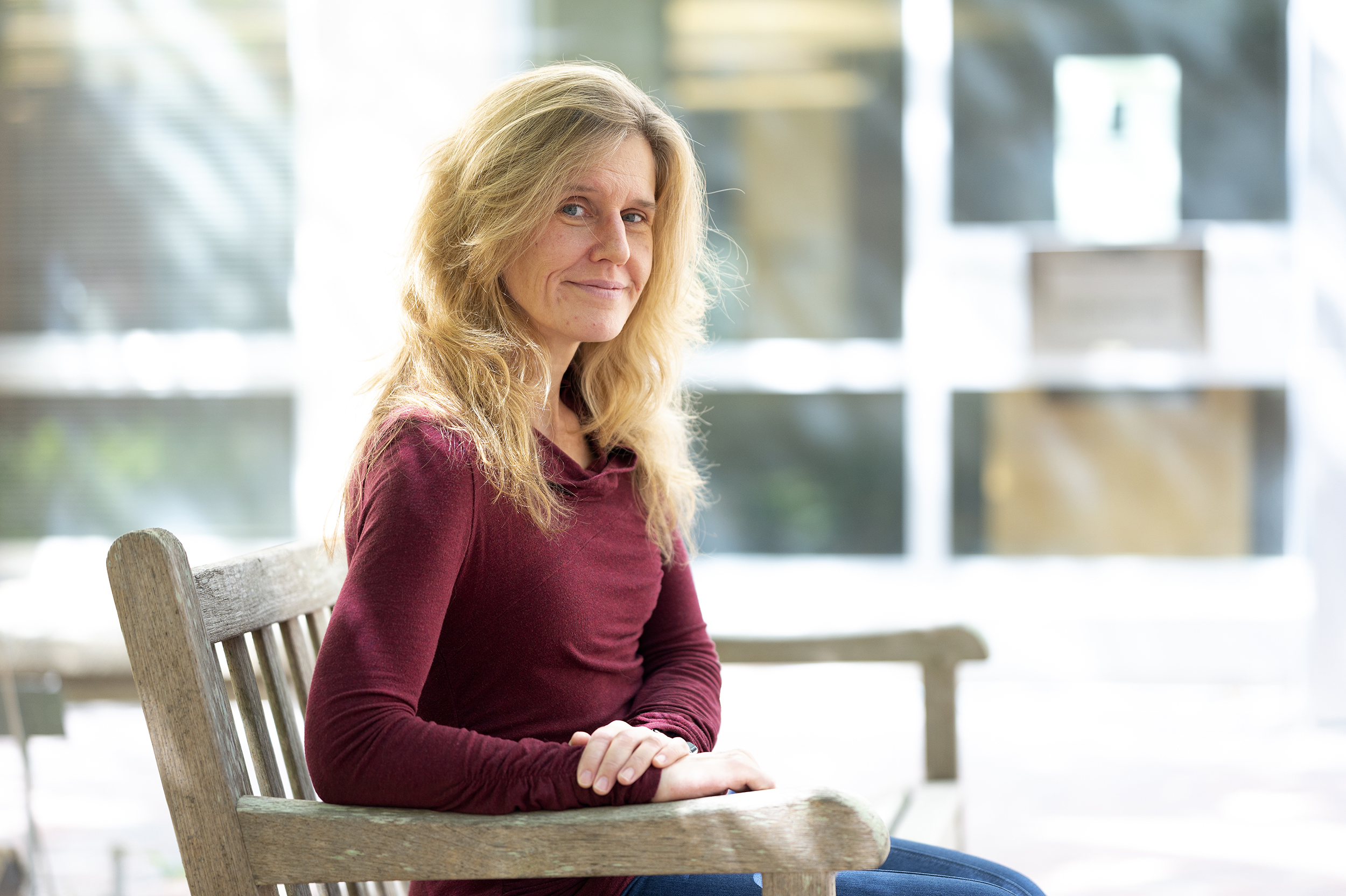Ethics at the Forefront
Posted on Nov. 13, 2020
Rebecca Walker is intrigued by events that force the hard questions we’d rather not answer. (Grant Halverson ’93)
Honest questions are the foundation of ethical thought. That’s why Rebecca Walker is so intrigued by events that force the hard questions we’d rather not answer.
“What is it we don’t want to think about? What are we trying not to talk about?” said Walker, who holds dual appointments at Carolina in philosophy and social medicine. “Usually those issues are the most important to be thinking and talking about.”
The coronavirus pandemic is bringing all kinds of painful calculations to the surface, highlighting plenty of issues we don’t want to think about too explicitly, plenty of questions we don’t want to articulate too clearly.
What’s the right balance between protecting life and destroying livelihoods? When does public safety override personal autonomy? Exactly how much risk is a restaurant meal worth?
Decisions big and small are now fraught with moral dilemmas. For a medical ethicist like Walker, who has spent years training doctors how to weigh impossible tradeoffs around life and health, it has been sobering to watch the whole world grapple with similar riddles in daily life.
“Throughout this pandemic, there has been a way in which we’re thinking much more consciously about each other and how we weigh our responsibilities to each other, even in small things,” she said. Ethics is about making values-based decisions, and we’re now being asked to rank competing values in all sorts of newly urgent ways. It’s easy to proclaim that safety is the most important priority, but what if it is in conflict with education? With mental health? With human relationships?
“How do you put all of those at the forefront? You can’t. You have to balance those, and any balance is going to leave some people unhappy.”
“What is it we don’t want to think about? What are we trying not to talk about? Usually those issues are the most important to be thinking and talking about.”
— Rebecca Walker
Facing up to hard choices is Walker’s specialty. Since 2003, she has led seminars for medical school students on the social dimensions of care and the ethical dilemmas that are baked into the health care system. Physicians have traditionally focused on solving discrete medical problems — mending wounds, treating diseases, restoring patients to health. Walker and her colleagues push UNC’s future physicians to think broader, to recognize that every patient carries a different set of values and that “health” is just one of them.
“Medicine shapes how we think about the most fundamental, enduring human experiences — conception, birth, maturation, sickness, suffering, healing, aging and death — as well as the metaphors we use to express our deepest concerns,” reads the intro to The Social Medicine Reader, which Walker helped edit and which forms the backbone of the seminar. “Social forces likewise have a powerful influence on medicine.”
That’s another core lesson the pandemic is driving home. The disparate impact of COVID-19 by race, profession and geography has sparked intense debate about the way social and economic differences affect health. Giving physicians a deeper background in those issues makes them more effective, Walker said, helping them see the peculiarities of each patient instead of simply focusing on the disease.
“We talk about family, we talk about race and gender. We talk about ethics, health policy, health care financing — thinking about these issues is important for doctor-patient relationships,” she said.
“As the view about medical school curriculum has evolved in the country, having a department like [social medicine] has become more attractive to the School of Medicine. So they’ve gotten even more invested in the idea that all medical students should have this experience.”
Walker’s deep interest in medical ethics emerged from a fellowship at Johns Hopkins. Fresh off her philosophy studies at Stanford, she was looking for a program that would help her take a highly academic approach to ethical reasoning and apply it to more pragmatic situations.
“I was always interested in how moral theory relates to moral practice,” she said. At Hopkins, she worked alongside a medical specialist and a law and policy expert to study the real-world implications of health care decisions for doctors and patients. Untangling the ethical implications of hospital policies, insurance rules and medical regulations gave her a new way of talking about ethical thinking.
“In that setting, you learn that the way you were talking about issues from your disciplinary standpoint just did not translate.” Nobody wants to debate the finer points of analytic philosophy in the emergency room, but the tools of philosophy could be useful in all kinds of day-to-day decisions about patient care. “It was really just two years of learning how to talk to other people about things I was interested in, and in ways that they could understand.”
Those lessons still show up in her writing and teaching. Her co-authored essay in The Social Medicine Reader is full of case studies and clear examples. Is it OK to lie to a patient if it might benefit his health? If a patient has religious objections to a treatment that would save her life, are you bound to honor her choice?
Reasonable people can argue either way. What Walker demands is an honest rendering of how you arrived at your answer. “I believe in transparency,” she said. “Being honest about the values and reasons that are driving us.”
At a time when everyday decisions seem to carry a whole seminar’s worth of ethical reasoning, getting back to first principles is a start.
“Thinking on a values-based level is really quite hard,” Walker said. “The truth is, we have a lot of values at play, and it’s complicated. But that’s why we have to try.”
— Eric Johnson ’08
Thanks for reading the Carolina Alumni Review
Carolina Alumni members, sign in to continue reading.
Not yet a member? Become one today.
